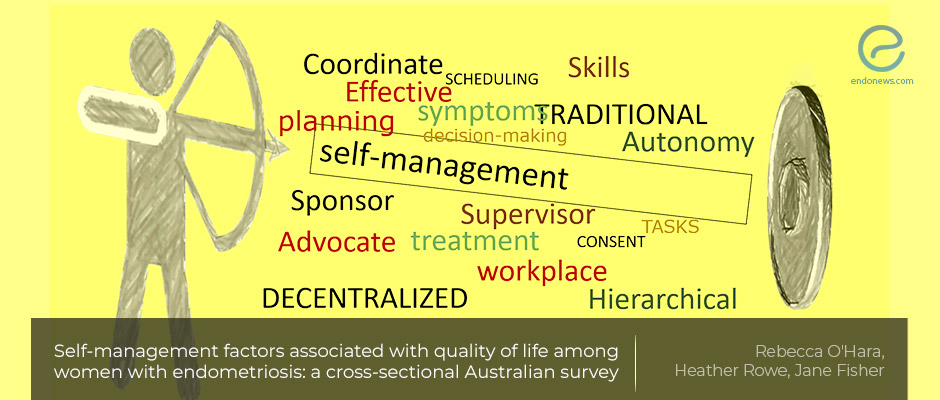Self-management and the quality of life in women with endometriosis
Feb 16, 2021
Improvement of self-efficacy in endometriosis patients would provide a significant benefit on well-being.
Key Points
Highlights:
- The quality of life in endometriosis patients is closely related with self-management factors.
- Active participation in planning, decision-making, undertaking tasks for managing the symptoms, treatment and the changes involved in living with a chronic disease is important.
Importance:
- Women with endometriosis should be counseled about self-management factors to improve both physical and mental quality of life.
What’s done here?
- This is an Australian cross-sectional, population-based online survey, conducted in women with surgically diagnosed endometriosis.
- Health-related quality of life, pain severity, use of hormonal treatments and pain medication prescriptions in the last 3 months, and self-management factors were evaluated.
- Self-efficacy, self-management capacity and self-care were assessed.
- Demographic characteristics including health insurance, age, education, income, partner,.. were also recorded.
Key results:
- A total of 620 women with endometriosis between 18-71 years of age were included.
- Income sufficiency and greater self-efficacy were significantly associated with physical quality of life while age, pain severity, prescription medication use, having a chronic disease management plan and number of self-care activities had a negative effect on the physical quality of life.
- There was a positive relationship between the mental quality of life and older age, having a partner, university education, increased self-efficacy, having healthy partners.
Strengths and Limitations
- The large sample size, use of structured instruments, performance of multivariate analyses including several covariates were major strengths of this study.
- The results of this cross-sectional study could not be generalized due to study design.
Lay Summary
Endometriosis symptoms can range from mild to severe. The most common presenting complaints are mainly pelvic pain and infertility. There is no doubt that the physical and mental quality of life of these women is adversely affected.
There are several studies evaluating the quality of life in endometriosis patients in a hospital or clinic setting. However, the effect of self-management factors on physical and mental quality of life in a community setting has not been investigated. O’Hara et al, from Australia, published a study titled “Self-management factors associated with quality of life among women with endometriosis: a cross-sectional Australian survey” in the journal Human Reproduction.
The authors sought to assess whether self-management factors have an impact on the physical and mental quality of life in surgically diagnosed endometriosis patients. Health-related quality of life, pain severity, use of hormonal treatments and prescription pain medications in the last 3 months and self-management factors were evaluated using a combination of validated survey with study-specific and standardized questions. The results showed that women having sufficient income and greater self-efficacy have a higher physical quality of life. On the other hand, age, pain severity, use of prescription medications, having a chronic disease management plan and the number of self-care activities had a negative significant effect on the physical quality of life. There was a positive significant association between older age, having a partner, university education, increased self-efficacy, having healthy partners and the mental quality of life.
“Greater self-efficacy was associated with improved physical and mental quality of life. Supporting women with endometriosis to improve self-efficacy may lead to improvements in this aspect of wellbeing.” the authors added.
Research Source: https://pubmed.ncbi.nlm.nih.gov/33378538/
quality of life psychology self-management women’s health health outcomes endometriosis chronic disease

